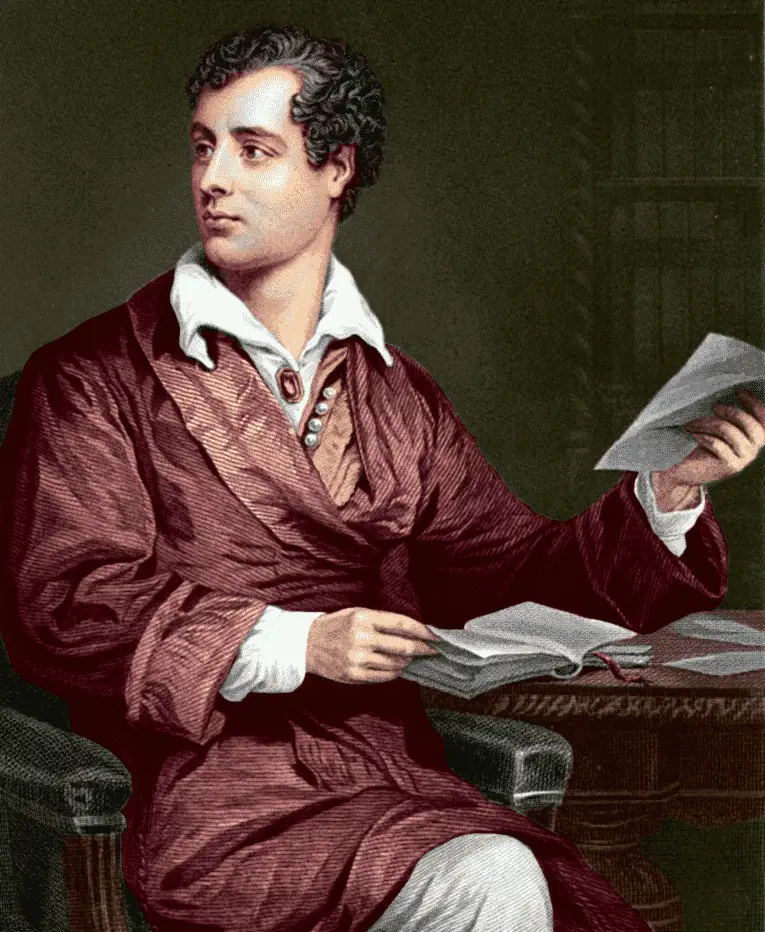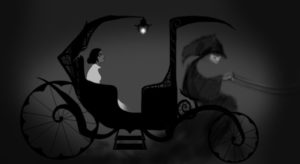
FULL POEM - SCROLL DOWN FOR LINE-BY-LINE ANALYSIS
When we two parted
In silence and tears,
Half broken-hearted
To sever for years,
Pale grew thy cheek and cold,
Colder thy kiss;
Truly that hour foretold
Sorrow to this.
The dew of the morning
Sunk chill on my brow—
It felt like the warning
Of what I feel now.
Thy vows are all broken,
And light is thy fame;
I hear thy name spoken,
And share in its shame.
They name thee before me,
A knell to mine ear;
A shudder comes o’er me—
Why wert thou so dear?
They know not I knew thee,
Who knew thee too well—
Long, long shall I rue thee,
Too deeply to tell.
In secret we met—
In silence I grieve,
That thy heart could forget,
Thy spirit deceive.
If I should meet thee
After long years,
How should I greet thee?—
With silence and tears.

LINE-BY-LINE ANALYSIS
STANZA 1
When we two parted
In silence and tears,
The tone of the poem is immediately emotive and personal, due to Byron’s use of direct address in the first line and the vivid recollection of their sadness (expressed with ‘silence and tears’) when the couple split up (the poem is thought to be autobiographical about the poet, Lord Byron, and Lady Frances Wedderburn Webster who was unfaithful to him with the Duke of Wellington).
Half broken-hearted
To sever for years,
The word ‘sever’ connotes violence, detailing the brutal emotional trauma of their parting. The image ‘Half broken-hearted’ illustrates Byron’s feeling that half of him has been lost or broken as a consequence.
Pale grew thy cheek and cold,
Colder thy kiss;
Paleness and coldness are symbols of death, a metaphor for the woman’s dying affection and passion for him.
Truly that hour foretold
Sorrow to this.
Upon reminiscing, the speaker realises that the demise of their relationship was foreshadowed by her coldness towards him. With hindsight, he acknowledges that their relationship was doomed from this point forth.
STANZA 2
The dew of the morning
Sunk chill on my brow—
The ‘morning’ is a pathetic fallacy for potential new beginnings for the speaker, however, he is reminded of the animosity felt for him by his former lover by the cold ‘dew’ on his forehead which mirrors the coldness of her heart.
It felt like the warning
Of what I feel now.
The poem switches from the past tense to the present as the speaker reiterates how her coldness towards him during their relationship foreshadowed its breakdown and, with it, the pain that he feels now.
Thy vows are all broken,
The woman’s ‘vows are all broken’, as are her promises of love and devotion to the speaker, suggesting that she committed adultery against him – implying that she played the primary role in ending the relationship.
And light is thy fame;
I hear thy name spoken,
And share in its shame.
These three lines are further evidence for the woman having an affair, describing her tarnished reputation and the shame felt by the speaker when he hears her name. The fact that he shares her shame implies that he feels ashamed himself for not being enough for her – an insult to his masculinity.
STANZA 3
They name thee before me,
This line is another indication that the poem is autobiographical and is directed towards Lady Frances Wedderburn Webster as the woman is very much in the public domain, causing Byron to frequently hear her name.
A knell to mine ear;
A shudder comes o’er me—
‘A knell’ is the solemn sounding of a bell during a funeral. Every time he hears her name (perhaps in conjunction with her relationship with the Lord of Wellington), his mind flashbacks to the traumatic death of their relationship for which this imagery of funerals is a reference.
Why wert thou so dear?
This rhetorical question is powerfully emotive and personal – in spite of her unfaithfulness to him, he recognises the love that he had for her and laments the loss of her feeling the same way. The inevitable lack of reply to the rhetorical question emphasises his loneliness, with only grief for company.
They know not I knew thee,
Who knew thee too well—
The speaker hints at a closeness both emotionally and sexually that they shared whilst together. The repetition of direct address towards the woman illustrates how memories of their relationship and the grief of its breakdown consume his thoughts.
Long, long shall I rue thee,
Too deeply to tell.
The reader that learns that as well as grief the speaker experiences bitter regret (the meaning of ‘rue’). It’s not clear whether is for losing her or having a relationship with her in the first place.
STANZA 4
In secret we met—
In silence I grieve,
These two lines are syntactic parallels due to their similar structure, however, the meaning of each juxtaposes (intimacy in the first versus isolation in the second) – portraying the stark disparity in the speaker’s life when in a relationship with the woman and the present day.
That thy heart could forget,
Thy spirit deceive.
Again syntactically parallel, the reader hears the speaker’s resentment in these two lines. He grieves how her heart could forget him, or she could no longer love him, and how she could deceive him by feigning her love for him whilst she had an affair with another man.
If I should meet thee
After long years,
How should I greet thee?—
With silence and tears.
In these final lines of the poem the speaker now directs his attention towards the future, such that the poem follows a satisfying progressive narrative following the speaker’s thoughts from the past, present to the future. He now questions how he would act if he saw her again, concluding ‘with silence and tears’. The repetition of ‘silence and tears’ from the first stanza narrating their parting conveys that, even ‘after long years’ his pain would still be as raw as it was then – signifying the vast emotional trauma that he suffered from their breakup.


